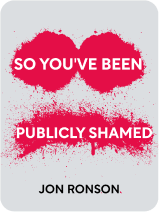

This article is an excerpt from the Shortform book guide to "So You've Been Publicly Shamed" by Jon Ronson. Shortform has the world's best summaries and analyses of books you should be reading.
Like this article? Sign up for a free trial here .
What was the scandal around Jonah Lehrer? What was the public response to Lehrer’s fiasco?
Jonah Lehrer is an American author and blogger who has written for several big media outlets including The Wall Street Journal and The New Yorker. In July 2012, Jonah Lehrer was found out to have falsified Bob Dylan’s quotes in his book Imagine: How Creativity Works. In response, Lehrer was publicly shamed.
Here is how Jonah Lehrer’s scandal unfolded and what happened in the aftermath.
Michael C. Moynihan and Jonah Lehrer
In July 2012, Michael C. Moynihan was working a ten-day blogging gig for The Washington Post. He was considering blogging about the differing opinions on self-plagiarism (reusing your own material) between the British and Americans—Americans considered self-plagiarism to be more of a crime. Writer Jonah Lehrer had been in the news about this at the time because he’d reused material from his columns for The Wall Street Journal in columns for The New Yorker.
Jonah Lehrer was a hotshot academic, writer, and speaker. He had won a Rhodes Scholarship to Oxford and wrote his first book while he was still a graduate student. He made tens of thousands of dollars in speaker fees for inspirational keynotes at important conferences and was compared to Malcolm Gladwell. When Lehrer started a new job at The New Yorker, it made the news.
Moynihan was curious about Lehrer and checked out his most recent book, Imagine, which is about creativity. The first chapter is about Bob Dylan. Moynihan knew a lot about Dylan and was suspicious of one of the quotes Lehrer attributed to him because usually, Dylan was rude to interviewers, but this particular quote sounded like a self-help book. Moynihan was doubtful of a few other quotes as well.
Digging Deeper
Moynihan wrote Jonah Lehrer to ask him about the quotes. Lehrer responded that he was on vacation but would get back to him in eleven days once he had access to his notes again. (Moynihan thought this timing was suspiciously convenient because Moynihan had said his deadline was in ten days.) Lehrer did write, though, that he’d gotten access to some unreleased interview transcripts from one of Dylan’s managers, and that one of the transcripted interviews was in an expensive, multivolume anthology called The Fiddler Now Upspoke.
What Lehrer didn’t tell Moynihan was that he hadn’t fact-checked his book. He hadn’t completely made up the quotes, just embellished them—he’d changed the odd word or added a phrase—and he’d used them in part of his book proposal and never gone back to verify them. He was “too lazy” (fact-checking is a long, arduous process that sometimes makes the book less colorful) and “too stupid.”
Moynihan found one of the relevant Dylan interviews in The Fiddler Now Upspoke and discovered that Dylan had never said the quote Lehrer had attributed to him. He also tracked down Dylan’s only manager, Jeff Rosen, who said he’d never spoken to Lehrer. Moynihan brought this up with Lehrer, who panicked. Moynihan started to get uncomfortable at this point too—the detective work had been fun, but watching Lehrer panic was painful.
Moynihan spoke with Lehrer’s literary agent, who told Moynihan that if he (Moynihan) published what he’d found out, Lehrer’s life would be ruined.
The Exposure
Moynihan sold the scoop on Lehrer’s false quotes to Tablet, a small online magazine, for $2,200. The night the story was due, Lehrer phoned him over and over again. Moynihan seriously considered not publishing because though Lehrer was completely in the wrong and Moynihan in the right, Moynihan knew the story really would ruin Lehrer’s life. By this point, however, Moynihan’s own career was at stake—one of his colleagues had found out he was writing about Lehrer, and both Moynihan’s editors and Lehrer’s literary agent knew about the story as well. If Moynihan didn’t publish, everyone would think the literary agent had bullied him into a cover-up, and he’d never be able to get another writing gig. Moynihan hit send.
Just before the story went live, Moynihan and Lehrer had one final phone call. Moynihan told Lehrer that he felt terrible, and Lehrer was unsympathetic, unapologetic, and icy. After hanging up, Moynihan replayed the conversation and wondered if, at heart, Lehrer was devious and had just been trying to emotionally manipulate Moynihan this whole time. Lehrer’s life was going to get ugly, but the experience was traumatic for Moynihan too—finding the story was an accident that could have destroyed his career, the stress was brutal, and he hardly even made much money.
In the Aftermath
The day Moynihan’s story was published, Lehrer resigned from his job. His publisher offered refunds to everyone who had bought Imagine and destroyed all unsold copies. Comments on the scandal popped up all over the internet, both about Lehrer’s making up of the quotes and about Lehrer’s stonewalling of and lying to Moynihan.
The public shaming didn’t stop at internet comments, however. Wired magazine, where Lehrer had previously worked, asked a journalism professor to look over Jonah Lehrer’s columns for journalistic misdeeds. He found some—Lehrer had plagiarized himself and others. (Moynihan was relieved to hear this—Lehrer really was sketchy.)
After seven months, Lehrer decided to publicly apologize for all his misdeeds during a keynote speech he was giving for an event with the John S. and James L. Knight Foundation. The speech was broadcasted live and a live Twitter feed was projected onto a giant screen right behind the speakers’ heads. The speech and public response started well—Lehrer started by saying he’d committed plagiarism and lied to cover it up. He noted that he’d disappointed his readers and wasted their money. A tweet showed up behind him that commended his directness. Ronson felt hopeful—people understood that seven months of shame was appropriate and now they’d lay off.
In the next part of the speech, Lehrer spoke about neuroscience to try to explain how he’d made his mistakes. He took this approach because he’s a rational, scientific thinker and because amore emotional approach would have been too painful. This came off as defensive and irrelevant and the live tweets accused him of being boring.
It got worse when Lehrer brought up a quote from a behavioral economist about the human brain being a “confabulation machine.” The live tweets accused him of passing the buck, using bad science, and being a sociopath. Twitter users wrote that they would never forgive him and he could never redeem himself. When they learned that Lehrer had been paid $20,000 for the speech, they were even more brutal. Lehrer experienced a moment of emotional shut-down, one of the stronger phases of shame.
Moynihan didn’t think much of the apology either. He thought Lehrer had been robotic and insincere, and used his word choice to be as slippery as possible. Lehrer had said he lied to a journalist “called” Michael Moynihan, not “to journalist Moynihan,” which Moynihan found insulting.
Eleven Months Post-Shaming
Four months after Lehrer apologized, he and his agent started pitching a new book about love. The book proposal (which was immediately leaked) included a scene of Lehrer’s panic after his quote invention was found out. It described him so panicked that he puked into a recycling bin.
Instead of realizing that Lehrer was suffering, people made fun of the excerpt, calling for witnesses to verify that the puking really did occur. Daniel Engber, who works for Slate, analyzed the proposal for plagiarism and found similarities between one of the chapters and an essay by one of Lehrer’s old colleagues at The New Yorker. Engber wasn’t sure if the similarities counted as plagiarism, but was convinced that even if Lehrer hadn’t actually plagiarised in this case, he’d do it again.

———End of Preview———
Like what you just read? Read the rest of the world's best book summary and analysis of Jon Ronson's "So You've Been Publicly Shamed" at Shortform .
Here's what you'll find in our full So You've Been Publicly Shamed summary :
- How public shaming can ruin people's lives
- Why public shaming isn't just a way to get corporations to do the "right thing"
- 6 strategies you can use if you're a victim of public shaming






